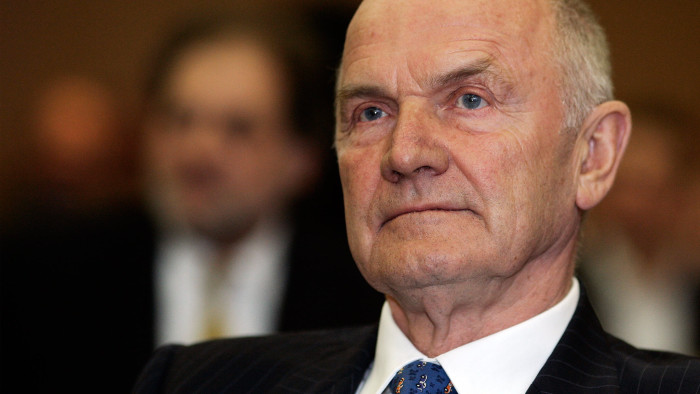German auto brands trio faces Silicon Valley competitors

Roula Khalaf, Editor of the FT, selects her favourite stories in this weekly newsletter.
In the early 1970s, when a young Ferdinand Piëch joined Audi, the German marque had lower revenues per car than Opel and was considered the weaker of the two brands.
Today, while Opel — General Motors’ European arm — tries to break even, Audi is highly profitable and slugging it out with BMW and Mercedes-Benz, the carmaking unit of Daimler, for the crown of the world’s top-selling premium carmaker.
That transformation is largely thanks to the work of Mr Piëch, an automotive trailblazer with a relentless focus on engineering and innovation who stepped down last month as chairman of Volkswagen, Audi’s parent.
But the shift upmarket has helped set up one of the most fascinating battles in modern carmaking, as Germany’s big three premium auto brands chase each other round the globe into new markets and push into ever more diverse product categories.
The dominance of German premium carmakers is reflected in the Millward Brown brand survey this year. BMW and Mercedes-Benz lie second and third among the auto brands, behind Toyota, the world’s biggest carmaker by sales.
Though further down the rankings, Audi’s ascent continues. Its brand value has risen 43 per cent in the past 12 months, part of a near 180 per cent rise in five years. That is thanks to impressive financial returns, with Audi’s €5.2bn operating profit last year accounting for about 40 per cent of VW group earnings.
“In the premium sector, there is fierce competition,” says Rupert Stadler, chief executive of Audi. “We are sitting close together [in Germany], so we smell each other, we love each other . . . but we fight.”
Audi, BMW and Daimler’s Mercedes-Benz marque account for about four-fifths of global premium sales, with Munich-based BMW taking top spot in global premium sales in 2014 with 1.8m deliveries.
With the space between the three ever tighter, each is looking to differentiate itself and establish a lead in the growth areas of the industry: low-emission vehicles, smartphone-era connectivity and autonomous driving.
At the same time, the three must counter the threat of entrants from Silicon Valley.
“There are some new players on the block now, including Tesla — I take them all seriously,” says Ian Robertson, BMW board member for sales and marketing, referring to the Californian electric carmaker run by Elon Musk. “The competition element is what makes it such an energetic and evolving industry.”
Audi has continued to move away from the likes of Renault and Ford since the 1970s and now includes some Italian brands, including supercar maker Lamborghini, motorbike brand Ducati, and engineer Italdesign Giugiaro.
The transformation, spearheaded by Mr Piëch, is often summed up by the Audi slogan Vorsprung durch Technik, or “Leading through technology”.
“It’s a 30 or 40-year story of continuous improvement,” says Felix Stoeckle, a Berlin-based partner at brand consultancy Prophet, who has worked with BMW and Mercedes-Benz.
Audi developed Quattro — introduced in 1980 as the first series production four-wheel drive system — as well as new lightweight technologies, such as the groundbreaking (but lossmaking) aluminium A2.
Now the company is at the forefront of what it calls piloted driving, with an A7 concept car driving itself from San Francisco to this year’s Consumer Electronics Show in Las Vegas.
But for all its gains, Audi still lags behind BMW and Mercedes-Benz in terms of operating profit, and all three face the challenge of what Mr Stadler calls the “new normal” in China.
There are also signs that the furious rate of change in the industry, and the intense capital spending that it requires, is eroding profitability. Audi is investing heavily in new models, technology and expansion overseas — all of which took a toll on the operating margin in its latest quarterly results.
“The most important thing is you really feel the technologies . . . Then you have to execute it in a proper way,” says Mr Stadler.
“Then you have to move on.”
Comments